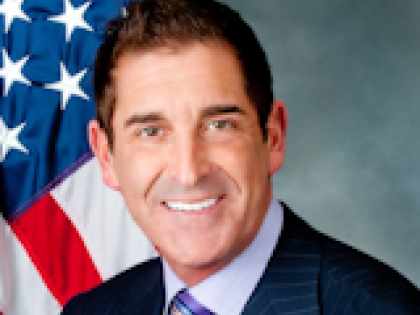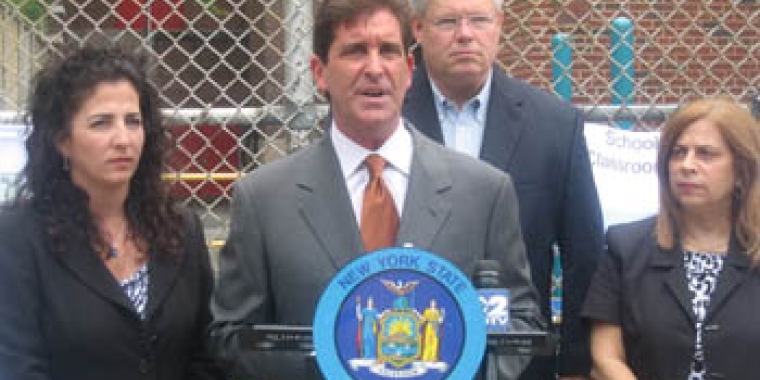
Work Hard, Play Hardly
Jeffrey D. Klein
June 22, 2008

Klein Releases Report: How NYC Public School Children Are Denied Adequate Outdoor Play Space
African American and Latino Students Disproportionately Affected
NEW YORK- Senator Jeff Klein (D-Bronx/Westchester) joined by Michael Mulgrew Vice President of the United Federation of Teachers (UFT), released the results of his latest report: Work Hard Play Hardly, How NYC School Children Are Denied Adequate Outdoor Play Space. The report is an updated review of a similar study conducted in 2003, which identified over 100 schools with Transportable Classroom Units (TCUs) encroaching on outdoor play space. The TCUs housed 14,000 students and in some situations, had been present for over 8 years. With childhood obesity on the rise, and 43% of all elementary school students either overweight or obese according to the New York City Department of Health and Mental Hygiene, adequate outdoor play space is more important than ever.
“A century of psychology testifies to the essential role of outdoor play to the social and emotional development of our children. Students need to be able to stretch both their minds and their legs in pursuit of a complete education. In light of the obesity epidemic which is most pronounced in low income and minority communities, DOE needs to re-evaluate its priorities and provide proper over-sight so that we can give all our children the education they deserve,” said Senator Klein.
Klein’s office conducted two surveys which were integrated into the report. In the first, data was collected by randomly surveying 160 elementary school principals, 72 of whom responded. Similarly, 51 of the 118 principals surveyed in 2003 responded to a separate survey about TCUs in particular. In total, 123 schools, or roughly 21% of the 585 elementary schools which received Progress Reports for the 2006-2007 school year were surveyed about their outdoor play space. Klein’s 2008 study reveals that 94% of NYC schools surveyed in 2003 still contain space consuming Temporary Class Room Units (TCUs), and many more lack playgrounds, tracks, schoolyards, and/or athletic fields.
The report found that 32% of schools lacked a schoolyard, 40% lacked a playground, 31% were not within 5 minutes walking distance of a park, and 78% lacked an athletic field. In addition, 48% of principals reported that the space is inadequate to serve all students, and 26% commented that the space they do have is not appropriate for all age groups. Across the board, 24% of schools randomly surveyed reported that TCUs currently occupy outdoor play space. Furthermore, of the schools surveyed with 2 or fewer outdoor space options for play, the student body was on average 71% African American or Latino. Of the students attending those schools, 85% were receiving free or reduced price lunches. Such conditions disproportionately occur in low income and minority communities which already suffer from high rates of childhood obesity and asthma.
“There is a great need for an expanded playground, especially with the high incidence of asthmatic children. Obesity is also a major health issue for my students and I have been trying for the past six years to get a bigger play space. I have yet to see any material progress although I am optimistic,” said the Principal of P.S. 102, Sandra Gittens, an educator for over 20 years.
According to the American Obesity Association, childhood obesity is at its highest ever. Among female youth, the highest overweight and obesity prevalence is found in black (non-Hispanic) girls (ages 6 to 11), 37.6 % and 22.2 % respectively, and black (non-Hispanic) adolescent females (ages 12 to 19), 45.5 % and 26.6 % respectively. Among male youth, the highest overweight and obesity prevalence is found in Mexican American boys (ages 6 to 11), 43 % and 27.3 % respectively, and Mexican American adolescent males (ages 12 to 19), 44.2 % and 27.5 % respectively.
A recently released report, The State of Play, by the New York City Public Advocate reveals that the vast majority of NYC elementary schools sampled failed to provide even 2 hours a week of physical education to students. This finding was echoed in More Than Child’s Play, a report by the Bronx Borough President’s Office. A survey of over 100 Bronx schools serving elementary school students revealed that 91% of schools offered fewer physical education hours than state minimum requirements. The report also found that in the Bronx, 23% of schools (impacting 17,000 students) do not have a gym. Of the 70% of schools using so-called multipurpose rooms instead of gyms, 75% of schools reported their condition as less than adequate.
In addition, Mayor Bloomberg’s PlaNYC, a sustainability plan for the city’s future, calculates that more than 2 million New Yorkers live more than 10 minutes from a park 97 neighborhoods in the 5 boroughs average 2,100 children per playground.
"Adequate playground space is essential to a good education and a healthy community," said Senator Jose M. Serrano (D-Manhattan/Bronx). "The district I cover suffers from high levels of obesity. In this sense, playgrounds are a form of preventive healthcare, helping to keep our kids fit before problems develop later in life," said the Senator, who is Ranking Member of the Tourism, Recreation and Sports Development Committee.
According to New York State law, “It shall be unlawful for a schoolhouse to be constructed in the city of New York without an open-air playground attached to or used in connection with the same.” – Education Law Section 2556(5), yet Klein’s study reveals that the reality falls short of the law.
Through the state budget process, Klein recommended that spending in future NYC capital plans reflect efforts to close inequity between schools with regard to outdoor play space. This should be done by installing and upgrading outdoor play facilities at high-need sites and continuing the creation of new schools that will add indoor seats and result in the reduction in the use of TCUs. In addition, Klein called on the DOE to prioritize projects that will facilitate the current NYC DOE policy of phasing out most TCUs by 2012.
Klein also proposed legislation which would require NYSED to make a report to the Governor and the state and legislature on the availability, size and condition of outdoor facilities for physical activity at each public school. The report should include whether each school has a playground, schoolyard, athletic fields or track on its grounds or a nearby park suitable for physical activity.
Furthermore, the report should described planned inclusion of outdoor play space in new capacity-generating construction projects including new schools and the impact of major renovations or changes to existing outdoor facilities as well as the utilization of Transportable Classroom Units (TCUs) at each public school.
Share this Article or Press Release
Newsroom
Go to NewsroomSenator Jeff Klein Hosts FDR Drive at Broad Street Playground
August 24, 2015

Senator Klein Finds Bronx Sex Offender in Violation of State Law
August 21, 2015

